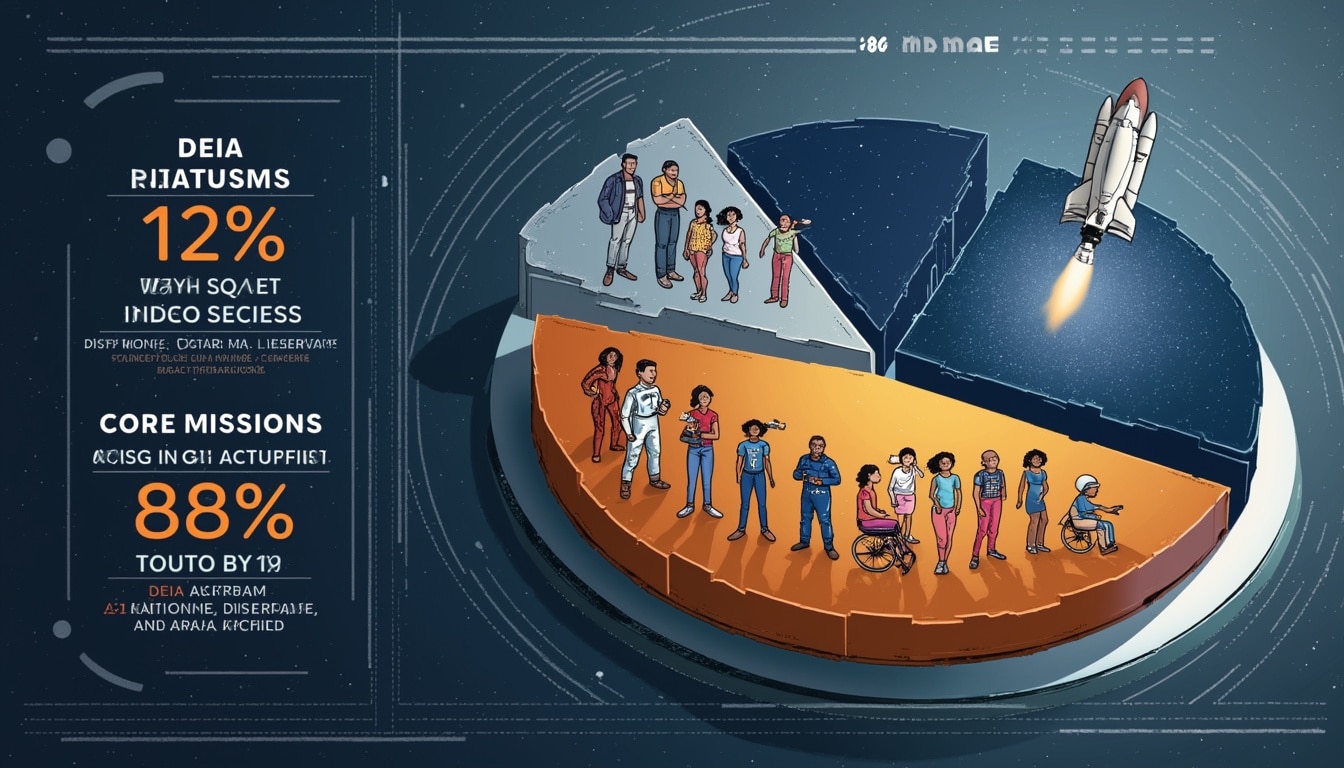Recent revelations from NASA’s internal communications have shed light on the agency’s controversial decisions regarding its Diversity, Equity, Inclusion, and Accessibility (DEIA) programs. As new directives roll out under Acting Administrator Janet Petro, there is growing concern among employees and advocates alike about the implications of these changes for NASA’s workforce and its mission. This article explores the intricacies of the changes, the responses from various stakeholders, and the potential impact on NASA’s future endeavors in space exploration.
The Rise and Fall of DEIA Programs at NASA
The DEIA initiatives at NASA were originally designed to cultivate a workforce that reflected the diversity of the nation and to foster an inclusive environment for all employees. These programs aimed to address longstanding issues regarding representation of underrepresented groups in STEM (Science, Technology, Engineering, and Mathematics) fields. However, recent decisions to dismantle these programs have raised alarms about the potential rollback of progress made over the past several years. The notion that NASA might regress in its commitment to diversity is troubling, especially as the organization is tasked with leading humanity’s exploration of space.

The Initial Purpose of DEIA Programs
Launched in response to critical demands for equity in the workforce, NASA’s DEIA programs sought to enhance recruitment and retention strategies for minorities and women in field positions. Over time, various metrics were established to gauge these efforts, such as increasing the participation of women and minorities in upper management roles and promoting an organizational culture that supports innovative ideas from diverse backgrounds. Nonetheless, despite these intentions, recent evaluations indicated that progress had stagnated, and numbers overall had not significantly changed.
Current Concerns from NASA Employees
The sentiment among many NASA employees is one of disappointment and frustration. In an email circulating among staff, Acting Administrator Petro called for prompt reporting of any DEIA violations while simultaneously instructing departments to sunset existing initiatives. This has raised questions regarding management’s commitment to inclusivity.
Furthermore, critiques from various departments highlight a disconnect between leadership intentions and the reality on the ground. Staff members worry that dismantling these initiatives will not only set back representation efforts but also hurt morale across the agency. Concerns have been voiced about how emerging technology and new scientific paradigms necessitate a workforce that is not only skilled but also diverse in thought and perspective, which is essential for innovation.
Criticism of Financial Decisions at NASA
NASA faced scrutiny for its financial decisions regarding DEIA initiatives, which some critics claim have wasted resources that could have otherwise been utilized for core missions in space exploration. Reports have highlighted how the agency contributed millions to programs that were criticized as ineffective. An article from IBTimes emphasizes the argument that a reallocation of funds may better serve NASA’s overarching goals. There is a perceived need for a more balanced approach that integrates equitable practices in a manner that supports operational objectives.

Finding the Right Balance
While financial accountability is critical, the challenge remains in identifying a balance between maintaining essential DEIA efforts and ensuring that NASA’s budget effectively supports its core missions. The controversial elimination of DEIA offices raises the question of whether a deep-seated commitment to diversity can coexist alongside fiscal restraint. Leadership must reassure employees that diversity initiatives are integral to achieving long-term objectives in space exploration and innovation. As the agency pivots towards future goals, it must avoid the pitfall of limiting its potential through a return to outdated practices.
The Broader Implications of Dismantling DEIA Programs
Removing the DEIA framework poses broader implications beyond mere budget constraints. In a field as dynamic and rapidly evolving as aerospace, fostering a diverse talent pool can lead to innovative breakthroughs. Without a commitment to inclusion, there is a genuine risk that NASA may fall behind compared to international counterparts, such as China and Europe, which aggressively pursue diversity in their space sectors. A lack of varied perspectives often results in homogenous thinking, which can stifle ingenuity and the capacity to navigate complex challenges that lie ahead.
NASA’s Future Directions Amidst Controversy
As NASA faces mounting scrutiny and internal pressures, the path forward appears muddled yet critical for survival. How the agency navigates these changes will define its role within the global space exploration arena. Considering a strategic overhaul of its DEIA approach can lead to new insights, creative solutions, and contribute positively to its ambitious goals of human expansion beyond Earth.

Redefining DEIA for the Next Generation
Looking ahead, NASA would benefit from redefining its DEIA framework, ensuring it is not merely a compliance exercise but a robust strategy that is closely intertwined with organizational goals. Creating an environment that values diverse talents, ideas, and experiences can enhance innovation and problem-solving capabilities. The future may involve reimagining how DEIA can fit into NASA’s identity as not only a leader in space exploration but also as a model for inclusive practices in the wider scientific community.
Employee Voices and Advocacy for Change
As the conversation unfolds, the voices of NASA employees advocating for positive change must be amplified. Many employees are eager to see their agency not only hold on to diversity initiatives but actively enhance them, creating spaces where varied voices are encouraged to participate in shaping the future of space exploration. Employee resource groups and advocacy platforms become vital in reshaping the narrative around DEIA at NASA, ensuring that the push for diversity is rooted in long-term values rather than temporary measures.
The Role of Public Support in Shaping NASA’s DEIA Policies
Public support for NASA’s commitment to diversity plays a crucial role in shaping its policies. As advocates and community members call for transparent decision-making, the agency must honor these expectations to build trust within the public domain. NASA’s alignment with societal values hinges on its ability to genuinely engage with the communities it represents. This includes ensuring that diverse perspectives are not only included within its workforce but also echoed in its outreach programs and mission objectives.

Sustaining Momentum for DEIA Efforts in the Future
For NASA to successfully navigate these transitions, sustained momentum for DEIA efforts is paramount. Engaging in ongoing dialogues with employees, stakeholders, and the public will be essential for revitalizing the agency’s vision. Establishing clear and measurable goals will help ensure accountability while driving awareness about the importance of diversity in achieving NASA’s exploratory missions. The commitment to diversity must transcend administrative preferences, becoming a core value that resonates throughout the organization.
Looking Forward: A Call for Unity and Progress
In this pivotal moment, advocating for diversity at NASA aligns with the broader quest for equity within society at large. Unity among advocates, employees, and the public can propel NASA towards a future where diversity is not only preserved but celebrated. As NASA aims to push boundaries in space exploration, allowing diverse voices and perspectives to flourish will undoubtedly strengthen its resolve and enhance its mission. It is the collective responsibility of everyone involved to ensure that the progress made in DEIA is maintained, cultivating a workspace where all can contribute their talents towards a shared objective: the exploration of the universe.




Leave a Reply